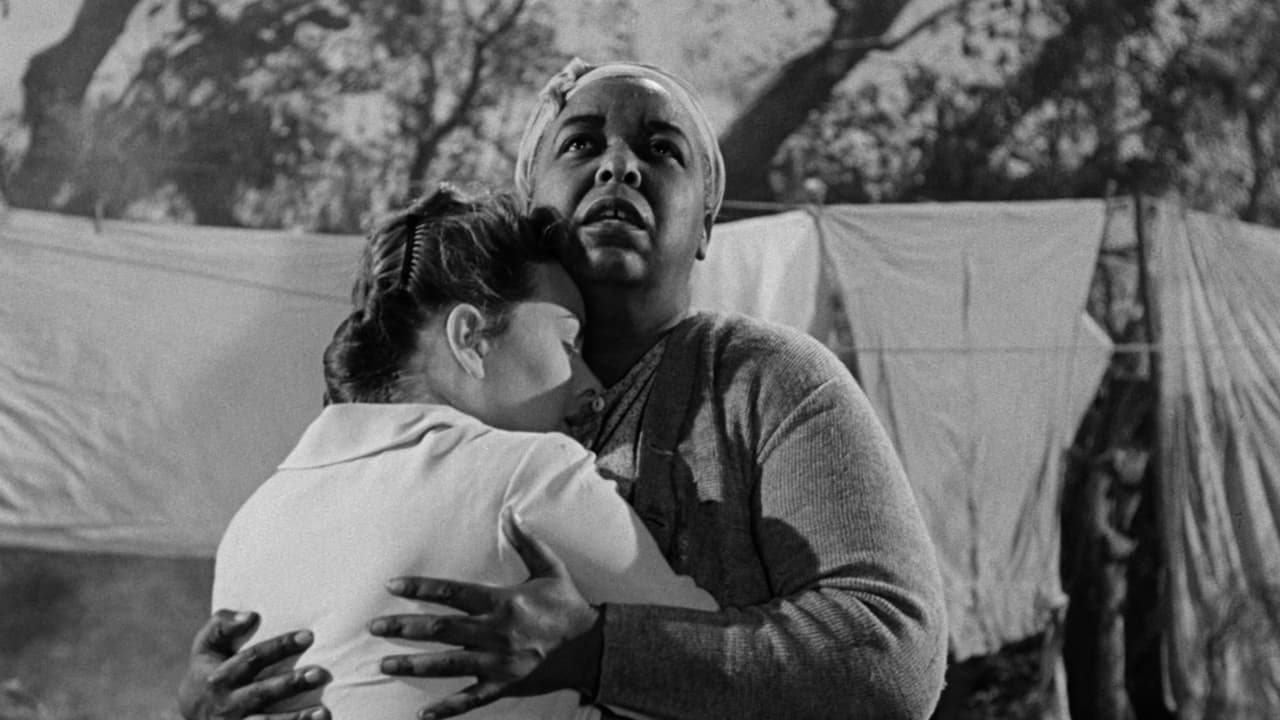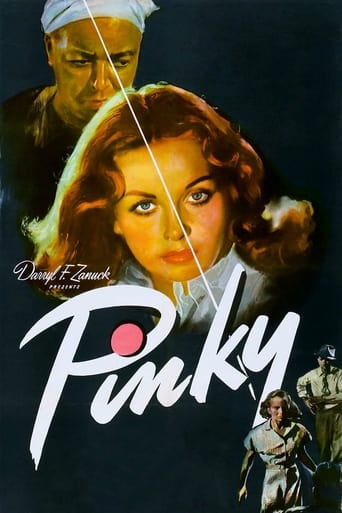

not as good as all the hype
... View MoreA lot more amusing than I thought it would be.
... View MoreThe performances transcend the film's tropes, grounding it in characters that feel more complete than this subgenre often produces.
... View MoreThe movie really just wants to entertain people.
... View MoreMany movies do not hold up over the years, regardless of how well they are made, due to the times changing. But this movie tries too hard...it wants to be ground-breaking but does not want to offend the whites who are harboring their prejudices, so they try to please everyone, racist and liberals, and it comes off as entirely phony. Why make this movie at all, if you are going to cater to the racists in the end? Pinky is not a very sympathetic character and her doctor boyfriend even less so. He wants her, even after finding out she is part black, but only if she goes back to pretending she isn't. But of course, they can't end up together, because the audiences of the day wouldn't stand for it, even though the actors are both clearly white.I know the studios had to pander to the ridiculous censorship code, but I think they would have been better off not making films that so clearly are hamstrung by the "rules" of the code.Hollywood made some ridiculous movies over the years, with various white actors playing Pacific Islanders or Asians for part of the movie, only to later "discover" that they were really white, so they could have the white hero in the end. This is a kind of reverse, but comes off just as phony and stilted.Some of the acting is fine, but the script is so leaden, it hardly matters. And Jeanne Crain delivers too many of her lines from between clenched teeth in an effort to appear taut and simmering. It just looks stiff. She must know how ridiculous her casting was.I also know movie-goers of the day were used to the phony sets, but they play better in some movies than in others. This one looks as fake as can be the whole time.
... View MoreJohn Ford is said to have directed part of this but, as it developed, he and Ethel Waters couldn't stand one another and Ford turned the helm over to Elia Kazan. (It doesn't look typical of the work of either man.) Basically, the eponymous character is a registered nurse who has left her job in Boston and returned to her childhood home in the African-American neighborhood of a rural Southern town. She lives with her black grandmother although Pinky herself couldn't look more "white" if she'd been Jeanne Crain or somebody.At first, as Crain wanders about the little town, folks think she's white but when it is revealed that she has a black grandmother, Ethel Waters, she's treated with the amiable disdain blacks in the rural South had to get along with in 1949.The scene in which her True Colors are revealed is emblematic. Crain visits a black man in the seedier part of the colored neighborhood. Taking note of this, a young black woman is seized with jealousy. An altercation erupts. The redneck cops arrive and break up the fight, and when the black woman says something like, "She ain't nothing but a colored gal herself," the cops slap her around. The Head Cop turns to Crain and asks with a chuckle, "It ain't true, is it?" Upon finding that it IS, the cops slap CRAIN around! It's interesting, from a sociological point of view, that Jeanne Crain, despite her severe hair style, looks and acts as white as any of the good townsfolk. It's that drop of black blood that is the criterial attribute. Genetically she may be only one sixteenth African, but she's coded as "colored" by everyone who knows about it. This is known as "the social construction of reality." She's colored not because she's mostly of African descent but because everyone agrees that she's colored. The same is true of Halle Berry (half "white") and Barack Obama (our first "black" president).Jeanne Crain as Pinky demonstrates her range as an actress, which isn't much but isn't dismissable either. She's a beautiful woman and in "Leave Her To Heaven", a few years earlier, was radiant. But there she was cheerful and self contained, and here she's sullen and pouting -- and that's about it. Ethel Waters gets the job done. Ethel Barrymore does rather more than that, and the supporting players do a professional job.One thing that struck me is that, except for a couple of incidents, race really played little part in the story. An outsider from Boston disrupts the little town and insinuates herself into the good graces (and the will) of the town's richest dying old lady. The mansion and its contacts go to the damned Yankee nurse instead of the local folks who know tradition when they see it.No one should be ashamed of his or her participation in this production. It's the product of seasoned talent, except for Elia Kazan who was just getting started. It doesn't preach. There are no Big Speeches about racism. In fact, the retired judge who sees to it that Crain gets Barrymore's mansion leaves her, saying that the outcome of the trial contesting the will, though it has gotten Crain the crumbling mansion, will bring no advantages to the community. That thought is insightful and neatly expressed.The denouement is improbable in the extreme. It's unlikely that Pinky would decide to stay in that rude community, much less turn her old mansion into a school for children. And it's frankly IMPOSSIBLE that when her white doctor boyfriend from Boston arrives, eager for marriage, she would throw him out and decide to stay with "her own kind." A NURSE -- rejecting an opportunity to marry a DOCTOR? The last shot has the camera descend on Crain's glowing face as she rings the bell for Em's School For Girls to start. A heavenly choir may be heard. She's found fulfillment. That happily sentimental shot could have come from John Ford, who sides with tradition even if nobody else does.
... View MoreRacial-issue melodrama has light-skinned black nurse (Jeanne Crain, improbably cast but doing good work) named a recipient in the will of a wealthy white southern dowager whom the nurse took care of in her final days; the will is contested by the deceased woman's greedy cousin, who is shown not only to be racist but a bigot and a liar as well. Atmospheric actors' piece, adapted from Cid Ricketts Sumner's book, allows white actress Crain to have a white boyfriend, but very little contact with the blacks on-screen (Pinky's own people!). There's a balky hesitancy detectable right from the start, and director Elia Kazan does very little to warm up the scenario. Still, the slim plot becomes absorbing by the second-half, with only the audience pulling for the resilient heroine. Crain has been directed to wear a racial chip on her shoulder with both pride and defensiveness (mostly she just looks unhappy). I didn't quite believe her relationship with laundress-grandmother Ethel Waters (who disappears after the courtroom sequence, one in which Pinky doesn't even take the stand in her own defense); however, Crain's misty-eyed, youthful determination brings out something extra in the role which neither the script nor the direction accounted for. She's tough, certainly, and stubborn, but she's also an intelligent presence--nobody's victim--and she garners our respect. Crain, Waters, and Ethel Barrymore (doing her usual dryly-bemused turn) all received Oscar nominations. **1/2 from ****
... View MoreI feel that the user reviews were articulate and genuine but the casting improper. Jeanne Crain is too fair to portray a black woman. A better choice would have been Jennifer Jones. It is not only skin color, but features. As beautiful as Halle Berry is, for example, she is not as white as Jeanne Crain. The grouchy relative of Ms. Em even said: "Why, she's whiter than me."The film is good but the one thing that left me disappointed was this one factor. I know women who have no black heritage in their ancestory yet they have a darker complexion and broader features than Ms. Crain.Trite point? Probably, but it distracted me from the essence of the film.
... View More